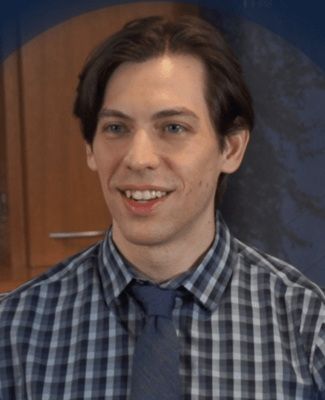Posted on December 9, 2022 by Rebekah Alegria
 Daniel Reyna,’18 earned his first bachelor’s degree in environmental science almost 10 years ago. But the COVID-19 pandemic prompted him to return to UTSA to follow his passion for biological advances and statistical data. Reyna, a native of El Paso, will graduate next week with a Bachelor of Science in Statistics and Data Science with a concentration in Biology from the Carlos Alvarez College of Business at UTSA.
Daniel Reyna,’18 earned his first bachelor’s degree in environmental science almost 10 years ago. But the COVID-19 pandemic prompted him to return to UTSA to follow his passion for biological advances and statistical data. Reyna, a native of El Paso, will graduate next week with a Bachelor of Science in Statistics and Data Science with a concentration in Biology from the Carlos Alvarez College of Business at UTSA.
Why did you choose UTSA?
I chose UTSA because of the high level of programs offered here. Originally, I was looking into the environmental science program at UTEP, but when I visited the campus here, I really felt like this program was a more suitable and better fit for me.
Even though there is a notable distance between San Antonio and El Paso, I also chose UTSA because it is close enough. I mean, a seven – or eight-hour drive is not the easiest, but it is a good balance of being able to be on my own while still having access to my family and being able to go back home whenever I need.
What inspired your choice to come back for a second bachelor’s degree in statistics and data science with a concentration in biology?
I wanted a degree that was a little bit challenging, but also extremely broad. Something that drew me to my degree was how I could apply it to so many areas. You are given the necessary tools to succeed, and when you are thrown out into the industry, there are so many different topics to take these tools and apply them to.
Being able to have a concentration in biology was a convincing factor to come back to UTSA at the bachelor’s level, given my environmental science background. Biology and statistics are connected in two broad ways. Within the concentration, you take both ecological and biomedical types of classes to be familiar with the different spheres of biology. Statistics fit into these topics in terms of, for example, clinical trials. Medical professionals need statisticians to evaluate progress on these types of things for the progression of medicine.
Do you have any professional work experience or internships you have taken part in?
Over the summer, I was accepted to participate in a research experience for undergraduates at Indiana University. I was able to study in the Department of Biostatistics in their School of Public Health. It was a life-changing experience. Prior to this opportunity, I was not really convinced that continuing with my master’ s or Ph.D. in my subject was the right move. I did a complete 180 after this experience. I know now that I am not done with stats. The whole experience was super challenging of course, but it reignited my passion like never before.
In addition to Indiana University this past semester, I had an independent study that turned into an undergraduate research assistantship working with a professor who was contracted through the San Miguel Electric Cooperative. We were looking at the properties of LI Night Coal and how their stockpile of coal gets affected over time using stats and time series analysis. It was also an amazing experience.
What is your favorite thing about being a Roadrunner?
My favorite thing about being a Roadrunner was finally getting back into classes and being able to meet people in person again. A lot of my second degree was online, but the students, the professors and the community here made my experience much more enjoyable.
What are your plans upon graduating from UTSA?
I plan to apply for Ph.D. programs and am currently in the process. I am studying for the GRE, looking for letters of recommendation, writing a statement of purpose and all that good stuff. This was not the original plan when I first started here at UTSA, but now I am excited to keep going and continue studying statistics.
What do you hope to do upon obtaining your Ph.D. in Statistics and Data Science?
So, the short answer of what I want to do with everything is honestly a big, “I don’t know.” After everything I have studied and learned, the biggest thing I want to be able to do is to make a positive impact on the world. There are 1,000,001 different problems that need solving. If I can find one area to really lend a hand in, that is what I will do. That is the idea behind my pursuit of biostatistics right now. Hopefully, the results from my studies will make improvements somewhere, someday.
Do you have any advice for current business students or incoming first-year students?
This is the most generic advice anybody could give, but get eight hours of sleep and read your textbook. I did not do that the first time I got a degree, but I did the second. The difference is a total game changer.

